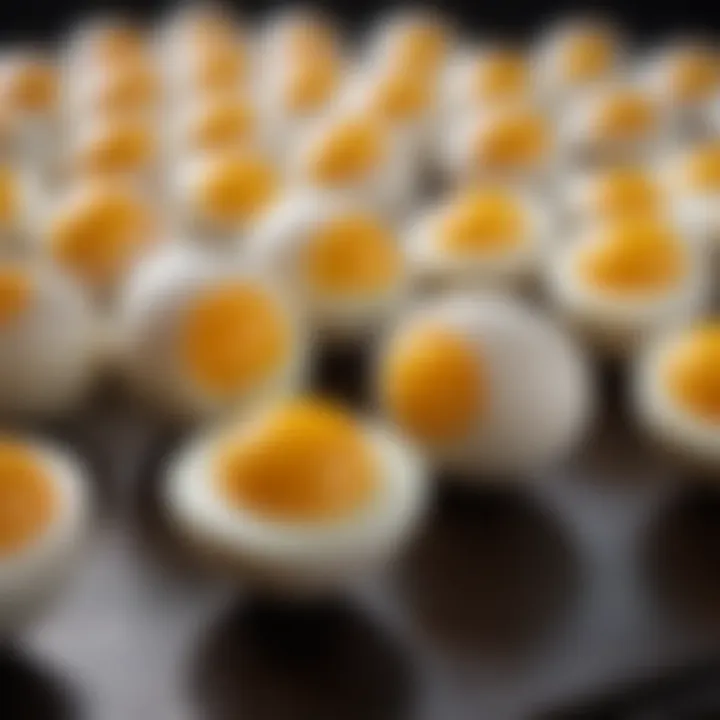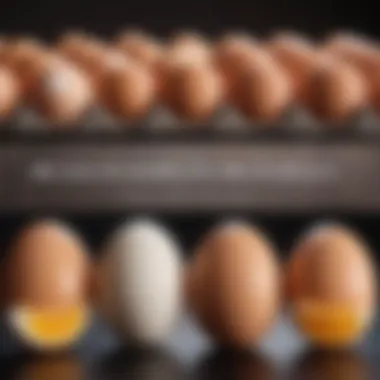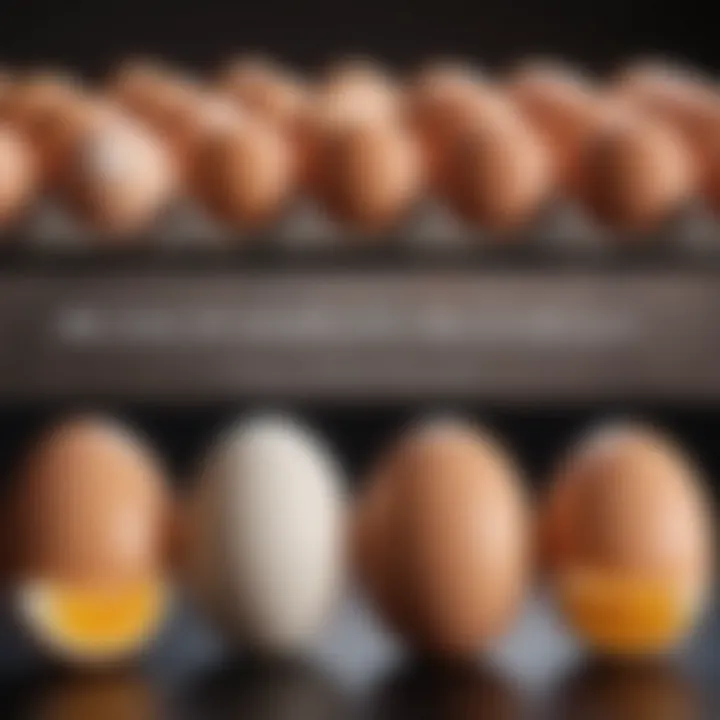Mastering the Art of Hard Boiling Eggs: A Comprehensive Guide


Intro
Hard boiling eggs may seem simple, yet it encompasses science and precise techniques. For health-conscious individuals, understanding the nutritional profile and cooking methods can significantly enhance dietary habits. This guide aims to demystify hard boiling by covering everything from the health benefits to practical methods of cooking eggs. It caters to both novice and expert culinary skills, inviting all to engage in this straightforward but essential cooking process.
Health Benefits
Eggs are highly regarded for their nutritional value. They are an excellent source of protein and vitamins, contributing to both physical and mental well-being.
Physical Health Benefits
Eggs are rich in essential nutrients, including:
- High-Quality Protein: One large egg can provide about 6 grams of protein, supporting muscle maintenance and repair.
- Vitamins and Minerals: Eggs contain Vitamin D, B12, and selenium, which are vital for various bodily functions, including bone health and immune support.
- Satiety: They can enhance feelings of fullness due to their protein content, which may aid in weight management.
Incorporating hard boiled eggs into meals can promote muscle health, support weight control, and provide essential nutrients.
Mental Health Benefits
Eggs also contribute to mental health:
- Choline: This nutrient is vital for brain health, playing a role in memory and mood regulation.
- Omega-3 Fatty Acids: Some eggs, such as those enriched with omega-3s, can support cognitive function and emotional well-being.
Including eggs in a balanced diet can bolster mental clarity and mood stability, which is particularly valuable in today’s fast-paced environment.
"The nutritional profile of eggs makes them a versatile ingredient for health enthusiasts and anyone aiming to elevate their cooking."
Practical Cooking Tips
Mastering hard boiling requires both technique and understanding. Here are practical methods and tips:
Cooking Methods
- Stovetop Method:
- Instant Pot Method:
- Oven Method:
- Place eggs in a pot, cover with water, and bring to a boil. Remove from heat, cover, and let sit.
- Use the steam setting for precisely cooked eggs in a shorter time.
- Bake the eggs in a muffin tin for an even cooking experience.
Creative Uses for Hard Boiled Eggs
- Salads: Add sliced eggs to enhance protein.
- Snack: Season with salt or spices for a quick energy boost.
- Sandwich Filling: Mash with avocado for a nutritious spread.
Exploring the versatility of hard boiled eggs can inspire creativity in meal planning while ensuring nutritional needs are met.
Prolusion to Hard Boiling Eggs
Hard boiling eggs is a fundamental skill in cooking that extends beyond mere nutrition. It speaks to precision in the kitchen, an understanding of the science behind food preparation, and the ability to create versatile ingredients that enhance various dishes.
Eggs offer many nutritious benefits. They are a rich source of protein, vitamins, and minerals, making them an ideal choice for those who are health-conscious. Hard boiled eggs can be included in salads, sliced onto sandwiches, or served as snacks. This makes them advantageous for meal planning and promotes a balanced diet.
Understanding the hard boiling process is essential, especially for health professionals, nutritionists, and wellness coaches. Knowledge of the right cooking methods and times can ensure that the nutritional content is maximized while minimizing any potential health risks associated with undercooking or overcooking.
Additionally, proper hard boiling techniques lead to better texture and flavor, preventing issues such as rubbery whites or green yolks. These are common pitfalls for inexperienced cooks, which can lead to dissatisfaction with what should be a simple dish. Considerations like water temperature and egg placement are more than trivial details; they significantly affect the outcome.
In this article, we will delve deep into the art and science of hard boiling eggs. We will explore various methods, equipment needed, and tips for perfect results every time. Our aim is to equip readers with practical knowledge and insights that elevate their culinary skills, enhancing their cooking experiences and fostering a deeper appreciation for this staple ingredient.
"Understanding the cooking process not only improves outcomes but enriches our relationship with food."
Thus, mastering hard boiling eggs is not merely a cooking task; it is an essential building block in the broader context of healthy eating and culinary excellence.
Nutritional Profile of Hard Boiled Eggs
The nutritional profile of hard boiled eggs highlights their role as a significant dietary component. Eggs are often celebrated for their high protein content and array of essential vitamins and minerals. Moreover, understanding these nutritional benefits is crucial for health professionals, wellness coaches, and fitness trainers when advising on balanced diets.
Protein Content
Eggs are particularly rich in protein. A large hard boiled egg contains approximately 6 grams of protein, making it a high-quality source. Proteins are vital for muscle repair, growth, and overall bodily functions. The protein in eggs comprises all nine essential amino acids, which are necessary for daily health. This quality makes hard boiled eggs a preferred choice for those aiming to maintain or build muscle mass.
Vitamins and Minerals
Hard boiled eggs are a great source of several important vitamins and minerals:
- Vitamin A: Crucial for maintaining healthy vision and skin.
- Vitamin D: Plays a role in calcium absorption, important for bone health.
- B Vitamins: Various B vitamins, including B12 and riboflavin, support energy metabolism and red blood cell formation.
- Selenium: An antioxidant that helps protect cells from damage.
These nutrients collectively contribute to several aspects of health. For instance, vitamin B12 is particularly relevant for vegetarians who might not obtain adequate amounts through dietary sources. Understanding vitamin and mineral content assists in planning diets for different individuals, including those with specific health concerns or restrictions.
Health Benefits
Incorporating hard boiled eggs into one’s diet offers a multitude of health benefits:
- Weight Management: Due to their high protein content, hard boiled eggs can promote a feeling of fullness, which helps control appetite and reduce overall caloric intake.
- Heart Health: Despite concerns about cholesterol, moderate consumption of eggs does not significantly impact heart disease risk for most people. They also contain healthy fats that are beneficial.
- Brain Function: The choline present in eggs supports brain health and cognitive function by contributing to neurotransmitter synthesis.
"Eggs are nutrient-dense; they pack a lot of nutrition into a small, portable package."
Hard boiled eggs provide a balanced mix of nutrients and are versatile in culinary applications. This nutritional profile makes them a worthy component of a health-conscious diet. Understanding these aspects enables professionals to better inform their clients on the benefits of including hard boiled eggs into their regular meal plans.
The Science of Egg Cooking
Understanding the science behind cooking eggs is essential to master the art of hard boiling them. Eggs are a nutritional powerhouse, and knowing how heat affects their composition can lead to precise cooking and enhanced flavor. This section delves into the core concepts that govern egg cooking, providing insights into the physical changes throughout the cooking process. By grasping these principles, readers can achieve the desired consistency and enhance their culinary skills.
Understanding Egg Composition
Eggs are composed of several key components: the shell, the egg white (albumen), and the yolk. Each part plays a significant role in how eggs react to heat. The shell provides protection, while the albumen mostly consists of water, proteins, and some minerals. The yolk contains fats, proteins, and various essential nutrients.
When heated, the proteins in both the albumen and yolk begin to denature, a process where they unfold and bond with other proteins. This process is pivotal as it transforms the liquid components into a solid state, giving hard-boiled eggs their characteristic texture. The temperature at which these changes occur is crucial; proteins in egg whites coagulate at around 60°C to 70°C (140°F to 158°F), while yolks begin to set at slightly different temperatures. Understanding these ranges allows for better control over the final outcome. When cooking, achieving the correct temperatures ensures a tender white with a fully cooked yolk.


Heat Transfer Mechanisms
The process of cooking an egg involves various heat transfer mechanisms: conduction, convection, and radiation. Each mechanism influences how heat penetrates the egg and affects its cooking time.
- Conduction is the transfer of heat through direct contact. When eggs are placed in boiling water, the heat moves from the water to the shell and then into the egg. This is important to maintain a steady cooking process.
- Convection occurs when the water around the egg circulates due to temperature differences. In a pot of boiling water, hot water rises and cooler water moves down, ensuring even cooking of eggs.
- Radiation, though less prominent in hard boiling, can come into play when eggs are cooked in an oven.
Essential Equipment for Hard Boiling Eggs
To achieve the perfect hard-boiled egg, selecting the right equipment is vital. The equipment helps streamline the cooking process, enhances the outcome, and ensures consistency. Understanding the essential tools allows both novice and experienced cooks to master this culinary technique with precision.
Pot Selection
Choosing the right pot is a crucial step in the hard boiling process. A sturdy pot should have a heavy bottom for even heat distribution. It is advisable to select a pot that can comfortably hold the number of eggs you wish to cook. Overcrowding can lead to uneven cooking, resulting in some eggs being undercooked while others may be overcooked.
They also should be large enough to allow water to circulate freely. Non-stick surfaces, while convenient, can sometimes interfere with the heat transfer needed for optimal results. Stainless steel or enameled cast iron pots are often preferred due to their durability and excellent heat conductivity.
Key Considerations for Pot Selection:
- Size: Ensure the pot fits the desired quantity of eggs.
- Material: Opt for materials that conduct heat evenly, like stainless steel.
- Lid: A well-fitting lid helps retain heat and can speed up the boiling process.
Thermometers and Timers
Precise cooking is essential for achieving the perfect texture in hard-boiled eggs. The use of thermometers allows for accurate monitoring of water temperature throughout the cooking process. Maintaining a consistent temperature helps ensure the eggs cook evenly.
Digital thermometers are particularly effective as they provide quick readings and can be used to check the water temperature to ensure that it reaches boiling point before placing the eggs in.
In addition, a timer is indispensable. Cooking time varies depending on your desired texture. Setting a timer ensures that you avoid the pitfalls of overcooking or undercooking.
Benefits of Using Thermometers and Timers:
- Accuracy: Digital thermometers provide precise temperature readings.
- Control: Timers help keep track of cooking durations, allowing for consistent results.
- Flexibility: Easily adjust cooking times based on preferences for doneness.
"Equipments such as thermometers and timers are not mere tools; they are the allies in your pursuit of culinary excellence."
Methods for Hard Boiling Eggs
Understanding the various methods for hard boiling eggs is essential for achieving the desired results in taste and texture. Each method has its own set of advantages and can be suited to different kitchens and lifestyles. By mastering these techniques, you can enhance your cooking skills and offer consistent results every time.
Traditional Stovetop Method
The traditional stovetop method is often the go-to approach for many cooks. This method is simple and requires minimal equipment. It involves placing eggs in a pot, covering them with water, and bringing it to a boil.
Steps:
- Place Eggs in Pot: Use a pot that comfortably fits the eggs without crowding.
- Add Cold Water: Fill the pot with enough cold water to cover the eggs by about one inch.
- Bring to Boil: Heat the pot on medium-high until a rolling boil is reached.
- Turn Off Heat: Once boiling, remove the pot from heat, cover, and allow the eggs to sit in the hot water.
- Cool the Eggs: Transfer the eggs to an ice bath or run them under cold water for a few minutes to stop the cooking process.
- Time Consideration: Depending on the size, leave them for 9 to 12 minutes.
This method makes use of the heat retained in the water to ensure that the eggs cook evenly without being overcooked. It is economical and accessible for everyone.
Instant Pot Method
Using an Instant Pot can streamline the hard boiling process significantly. This approach utilizes pressure cooking, which allows for precise cooking times and can handle large batches efficiently.
Steps:
- Prepare the Pot: Place a steamer basket or trivet in the Instant Pot.
- Add Water: Pour one cup of water into the pot.
- Arrange Eggs: Place eggs on the steamer basket or trivet.
- Set Pressure: Close the lid securely and set the Instant Pot to high pressure for 5 to 7 minutes based on your preferences.
- Release Pressure Quickly: After the cooking time is done, use the quick-release function to let out steam.
- Ice Bath Finish: Just like with the stovetop method, place the eggs in an ice bath afterwards.
The Instant Pot method reduces the risk of cracking and offers perfect results with less oversight.
Oven Method
For those looking to cook a larger quantity of eggs, the oven method may be particularly beneficial. This method allows for hands-off cooking and can be a practical choice when managing multiple recipes.
Steps:
- Preheat the Oven: Set your oven to 325°F (163°C).
- Prepare a Muffin Tin: Place eggs in a muffin tray to prevent rolling during cooking.
- Bake: Put the tray in the oven and bake for about 25 to 30 minutes.
- Cool Off: After baking, transfer eggs to an ice bath for at least 10 minutes.
This method is effective and works well for batch cooking. It also ensures an even cooking temperature throughout the eggs.
Reminder: Different methods yield slightly different flavors and textures. Adjust times based on altitude and egg size for optimal results.
Timing and Temperature Considerations
Timing and temperature play a pivotal role in the process of hard boiling eggs. They are the key variables that determine the final result you end up with: the texture of the yolk, the firmness of the white, and even the easiness of peeling. Getting either of these factors wrong can lead to disappointment.
Understanding the right timing allows you to achieve that perfectly cooked hard boiled egg. Too little time can result in a soft center, while too much can give you a chalky texture. Therefore, it’s essential to grasp how time correlates with temperature. Together, these elements form the foundation for consistency in your results.
Furthermore, adjusting the temperature during cooking can also minimize common issues, such as cracked shells or overcooked eggs. Here, we will dive deeper into two critical aspects: optimal cooking times and temperature control.
Optimal Cooking Times
Optimal cooking times vary according to the method utilized and the size of the eggs. Generally, here are the guidelines based on method and egg size:
- Stovetop Method:
- Instant Pot Method:
- Oven Method:
- Large eggs: 9-12 minutes
- Medium eggs: 8-11 minutes
- Small eggs: 7-10 minutes
- Large eggs: 5-6 minutes (plus natural release)
- Large eggs: 30 minutes at 325°F (160°C)
These cooking times ensure that you achieve varying degrees of firmness, from slightly creamy to fully hard yolks. Remember to allow eggs to sit in the hot water or steamer even after removing them from the heat source for precisely the right texture.
Temperature Control
Temperature control is essential in maintaining an effective cooking environment. Here are several vital points to consider:
- Starting Temperature:
Begin with eggs at room temperature if possible. This helps to minimize cracking due to thermal shock when placed in hot water. Frozen or very cold eggs should be brought closer to room temperature before cooking. - Water Temperature:
For the stovetop method, bring water to a full boil before adding eggs. If using an Instant Pot, the temperature is controlled automatically as it builds pressure. - Cooling Off:
After cooking, immediately transfer the eggs to an ice bath. This not only stops the cooking process but also helps in creating a more favorable environment for peeling.


Tip: Keep a thermometer handy to ensure your water temperature is where it needs to be.
Consistent application of these timing and temperature considerations ensures that the eggs you produce will meet or exceed expectations. Armed with knowledge of these elements, you can turn hard boiling into a process marked by precision rather than chance.
Cooling and Peeling Techniques
The cooling and peeling process of hard boiled eggs is a critical component of ensuring the final product is both visually appealing and palatable. Proper cooling techniques help prevent overcooking, which can affect texture and taste. Moreover, effective peeling methods are essential for maintaining the egg’s integrity. These techniques ultimately enhance the overall experience for the eater while ensuring that the health benefits of the egg are preserved.
Ice Bath Method
The ice bath method is widely recommended for cooling hard boiled eggs. This technique involves submerging the eggs in a bowl filled with cold water and ice immediately after cooking. The rapid temperature change that occurs from hot to cold helps stop the cooking process, preventing a rubbery texture and undesirable green ring around the yolk. This method typically takes about 10-15 minutes.
- Immediate Action: As soon as the timer goes off, remove the eggs from the hot water.
- Preparation of Ice Bath: Fill a large bowl with cold water and add ice cubes.
- Submerge Eggs: Carefully place the hot eggs into the ice bath.
Another key advantage of this cooling method is that it also aids in making peeling easier. The shock of coldness can loosen the egg white from the shell, minimizing the effort needed when peeling.
Peeling Tips
Peeling hard boiled eggs can sometimes be a frustrating task, especially if the shell does not come off cleanly. Here are some useful tips to ease the peeling process:
- Use Older Eggs: Fresh eggs are harder to peel. If possible, use eggs that are a week or so old.
- Crack the Shell Gently: After cooling, gently tap the egg on a flat surface to create cracks all over the shell. This can help in removing smaller pieces of shell.
- Peel Under Water: Some find it helpful to peel the eggs under running water or submerged in a bowl of water. This technique can wash away any small shell fragments and reduce mess.
- Start at the Wider End: Begin peeling from the larger end of the egg where there is typically an air pocket. It can be easier to start here.
"The combination of an ice bath and these peeling techniques can elevate your hard boiled eggs from simply good to perfect."
Common Issues and Troubleshooting
In the art of hard boiling eggs, encountering issues can be a common experience that affects both the outcome and enjoyment of the cooking process. Understanding these common problems not only enhances your cooking skills but also minimizes frustration. This section addresses two major issues: cracked eggs, and difficulty in peeling, providing insights and solutions that are relevant for anyone aiming for perfection in their egg preparation.
Cracked Eggs
Cracking during the cooking process is a frequent issue faced by people when boiling eggs. This often occurs due to thermal shock. When cold eggs are placed into boiling water, the sudden temperature change can cause them to crack. Another reason is overcooking. If eggs are cooked for too long, the pressure inside the egg can build, leading to fractures in the shell.
To prevent this, consider the following tips:
- Use room temperature eggs: Bring eggs to room temperature prior to cooking. This reduces the risk of thermal shock.
- Puncture the shell: Use a pin or egg piercer to make a small hole in the rounded end before placing it in boiling water. This helps to release pressure.
- Gradual heating: To gently heat the eggs, you might start them in cold water and gradually bring it to a boil.
If cracks do happen, there’s still a way to salvage your eggs. The egg white may leak out into the boiling water, but don’t worry. The remaining egg can still cook properly and be used in many dishes.
Difficulty in Peeling
Peeling boiled eggs can sometimes become an arduous task that leaves frustrating results. Eggs that are difficult to peel often belong to the category of fresh eggs. Fresh eggs are known to have a lower pH level, which leads to more adhesion between the egg white and the shell's inner membrane.
Here are some strategies to ensure easier peeling:
- Older eggs: Opt for eggs that have been refrigerated for a week or more. These tend to peel more easily due to the increased pH level.
- Ice bath technique: Immediately transferring eggs to an ice bath after boiling can shock the egg, causing the membrane to contract away from the shell, making it easier to peel.
- Peeling under water: Running the egg under cool water while peeling can further help detach any stubborn bits of shell.
"Using older eggs can vastly improve your peeling experience, notably reducing the chances of unsightly results."
Storing Hard Boiled Eggs
The storage of hard boiled eggs is a critical aspect that affects both the quality and safety of this versatile food. Understanding how to store them properly not only maintains their flavor and texture but also ensures that they remain safe for consumption over time. In this section, we delve into two key facets of storing hard boiled eggs: refrigeration guidelines and considerations around their shelf life.
Refrigeration Guidelines
To optimally ensure the freshness of hard boiled eggs, refrigeration is essential. After a batch has been cooked, they should be cooled promptly. This cooling process can be effectively accomplished through an ice bath, as previously discussed, and then transferred to a storage container.
Here are the specific details for storing hard boiled eggs:
- Immediate Refrigeration: Place eggs in the refrigerator within two hours of cooking to inhibit any potential bacterial growth.
- Storage Container: Store eggs in a covered container to prevent absorption of odors from other foods. Using a plastic or glass container is preferable.
- Keeping the Shell On: It is advisable to keep the shell on until you are ready to eat. The shell acts as a natural barrier, preserving moisture and flavor.
Educating yourself on these guidelines enhances not only the safety but also the enjoyment of hard boiled eggs.
Shelf Life
The shelf life of hard boiled eggs is another crucial consideration. Knowing how long they can be kept can help in meal planning and reduce food waste.
- In the Refrigerator: Properly stored hard boiled eggs can last up to one week in the refrigerator. It is wise to label the container with the date they were cooked.
- Freezing: While freezing is not generally recommended for hard boiled eggs due to texture changes, the egg yolks can be frozen and may last up to three months.
- Signs of Spoilage: Always check for signs of spoilage before consuming. An off smell or discoloration typically indicates that the egg should be discarded.
"Understanding the right storage methods greatly enhances the safety and quality of hard boiled eggs, enabling them to remain a staple in your diet."
Culinary Uses for Hard Boiled Eggs
In the realm of gastronomy, hard boiled eggs are more than just a simple snack. Their versatility makes them an essential ingredient across numerous culinary applications. This section explores how hard boiled eggs can enhance various dishes while prioritizing health and nutrition. Hard boiled eggs provide a rich source of protein, essential vitamins, and minerals, making them suitable for many diets. Understanding their culinary uses can empower home cooks and professionals alike to innovate and adapt traditional recipes.
Salads and Sandwiches
Salads and sandwiches greatly benefit from the inclusion of hard boiled eggs. These eggs add texture, protein, and a nutritional boost. One of the most popular salads featuring hard boiled eggs is the classic Cobb salad. This dish often includes ingredients like grilled chicken, bacon, cheese, and ripe avocados. Adding hard boiled eggs enhances the overall protein count, making it a wholesome meal. Additionally, providing a creamy consistency, the yolk can serve as a dressing base or enhances flavor when mashed into avocado or hummus.
When it comes to sandwiches, hard boiled eggs also shine. An egg salad sandwich is a cherished favorite in many households. Preparing this typically involves mincing hard boiled eggs and mixing them with mayonnaise, mustard, and spices. This combination yields a rich, savory spread ideal for use in sandwiches or as a dip for crackers and vegetables. Moreover, a brunch sandwich featuring hard boiled eggs, smoked salmon, and cream cheese can elevate any morning meal.
- Considerations for Inclusion:
- Dietary Restrictions: Many individuals find hard boiled eggs suitable for various diets, including paleo and keto.
- Easy Preparation: Hard boiled eggs can be prepared in bulk and stored, allowing for easy meal prep.
"Creativity in the kitchen with hard boiled eggs opens up a world of culinary possibilities, providing health benefits while satisfying culinary cravings."
Deviled Eggs Variations
Deviled eggs offer a delightful playground for creativity and flavor. Traditional recipes call for mixing the yolk with mayonnaise, vinegar, mustard, and seasonings, then piping it back into the egg white. However, there are numerous variations to explore, enhancing complexity and appeal.
- Spicy Variants: For those who enjoy a kick, consider adding chopped jalapeños, sriracha, or a sprinkle of cayenne pepper to the yolk mixture.
- Herbed Versions: Incorporating fresh herbs, such as dill, chives, or coriander can refresh this classic dish. These herbs not only add taste but also elevate the nutritional value.
- Gourmet Touches: One could try smoked salmon or bacon bits as toppings to mix textures and flavors. This could turn a standard appetizer into a gourmet delight suitable for gatherings.
The appeal of deviled eggs lies in their adaptability. They can serve as appetizers at a party or as part of a nutritious lunch. They also cater to various dietary preferences, as variations can include low-fat mayonnaise, Greek yogurt, or vegan substitutes.
By focusing on these culinary uses of hard boiled eggs, one recognizes their ability to serve not just as a simple food, but as an ingredient that enhances overall meal quality and nutritional value. This versatility addresses the needs of health professionals and culinary enthusiasts alike, opening doors for creativity in their respective kitchens.
Nutritional Considerations


Understanding the nutritional considerations of hard boiled eggs is essential for anyone looking to enhance their diet. Eggs, particularly hard boiled ones, are a versatile food option that offers numerous health benefits. Their nutrient density makes them a valuable addition to the meals for those focused on wellness and fitness. In this section, we will delve into two specific aspects: cholesterol levels and dietary restrictions. Each plays a vital role when evaluating the impact of including hard boiled eggs in everyday nutrition.
Cholesterol Levels
When it comes to hard boiled eggs, cholesterol is often a topic of significant discussion. One large egg contains about 186 milligrams of cholesterol. This figure is relatively high, particularly when compared to daily dietary recommendations.
For years, health experts advised limiting egg consumption due to cholesterol concerns. However, recent research suggests that dietary cholesterol may not have as much influence on blood cholesterol levels as once thought. For many people, the saturated fat in their diet holds more sway over cholesterol levels than the cholesterol found in eggs.
It's crucial, however, to consider individual health circumstances. For individuals with specific conditions, like hypercholesterolemia, monitoring cholesterol intake is prudent. This group may need to limit their egg consumption or discuss their dietary choices with healthcare professionals. To summarize:
- Understanding personal health: Consulting with a doctor is wise if concerned about cholesterol.
- Recent studies indicate: For most, moderate egg consumption does not adversely affect cholesterol.
- Balance is key: Combining eggs with a diet rich in fruits, vegetables, and whole grains can yield positive health outcomes.
"Dietary cholesterol's influence on blood cholesterol levels is less significant than previously believed, but moderation remains essential."
Dietary Restrictions
Dietary restrictions can vary widely based on personal, ethical, or health-related motivations. For instance, individuals on a vegan diet would avoid eggs altogether. Others might incorporate eggs but need to limit their intake for health reasons.
For those with dietary restrictions, understanding how hard boiled eggs fit into their eating plans is essential. Here are some general considerations:
- Allergies: Egg allergies are common, especially among children. Individuals with this allergy should strictly avoid any form of egg, including hard boiled.
- Vegan alternatives: Many plant-based substitutes mimic the texture of eggs, such as chickpea flour or flaxseeds in recipes requiring a binding agent.
- Health conditions: Some people might avoid eggs due to higher cholesterol or certain heart conditions. It's important to consult a healthcare provider to find a suitable approach.
Considering these factors ensures that individuals can make informed choices that align with their nutritional goals. Hard boiled eggs can be part of a balanced diet, as long as consumption takes into account personal dietary requirements.
Egg Varieties and Their Impact
Understanding the impact of different egg varieties is crucial when mastering hard boiling techniques. The type of egg you choose can affect both the cooking process and the final taste and texture of the dish. Each variety contains distinct characteristics that are worth exploring. This section focuses on two prominent types: organic eggs and the comparison between free-range and conventional eggs. Both elements play a role in health, nutrition, and ethical considerations.
Organic Eggs
Organic eggs are produced from hens that are fed an organic diet. This means no synthetic fertilizers or pesticides are used in the feed, and the birds are not given antibiotics or growth hormones. The advantages of organic eggs extend beyond the farming methods. Studies suggest that organic eggs may have higher omega-3 fatty acids and better vitamin profiles, which can contribute positively to a balanced diet.
When hard boiling organic eggs, cooks might notice that the shells tend to be harder and easier to peel compared to conventional ones. This phenomenon can be attributed to the hens' diets and their living conditions, affecting shell quality and overall freshness. Many health-conscious readers prefer organic options not just for the nutritional benefits but also for peace of mind regarding animal welfare.
Free-Range vs. Conventional
The definitions of free-range and conventional eggs are significant for consumers. Free-range hens are given access to the outdoors, which allows for natural behaviors. Conversely, conventional eggs come from hens that are usually kept in more cramped conditions, with limited access to outside environments. These differences in husbandry practices can lead to variations in egg quality.
Nutritionally, free-range eggs are often perceived as superior. They typically have richer yolks with deeper shades of yellow, which some attribute to the hens’ diverse diets including insects and green plants. When boiling free-range eggs, the flavor and texture might be more desirable due to these dietary factors. However, it's essential to note that the environmental impact and ethical treatment of animals raise crucial considerations for mindful consumers.
"Choosing the right eggs is not just about nutrition; it's about choosing a lifestyle that aligns with personal values and health goals."
By being informed about the impact of egg varieties, consumers can make decisions that resonate with their dietary preferences and ethical standards.
Cultural Perspectives on Hard Boiled Eggs
Hard boiled eggs have transcended beyond mere culinary items to become symbols of culture, tradition, and nourishment throughout the globe. Understanding various cultural perspectives allows us to appreciate the egg not only as a food source but also as a vessel of deep-rooted customs and beliefs. This section highlights the significance of hard boiled eggs in different cultures, providing insight into their various uses and meanings.
Global Variations
Different countries present unique variations on hard boiled eggs, showcasing how this simple dish can be adapted to suit local tastes and ingredients. For instance:
- Japanese Ajitsuke Tamago: These are marinated soft boiled eggs, often served atop ramen. Their rich, sweet soy-based marinade captures umami flavors while enhancing traditional dishes.
- Chinese Tea Eggs: These eggs are hard boiled and then cracked, soaked in a mixture of tea and spices, creating visually appealing marbled patterns and a savory taste.
- Spanish Huevos Rotos: A breakfast dish featuring hard boiled eggs served over fried potatoes and cured meats, reflecting the hearty, communal aspect of Spanish dining.
- Middle Eastern Shakshuka with Hard Boiled Eggs: While traditionally made with poached eggs, some variations incorporate hard boiled eggs to add protein to this rich, tomato-based dish.
These cultural interpretations not only reflect local ingredients and cooking techniques but also highlight the versatility that hard boiled eggs can possess.
Traditional Recipes
Diving deeper into cultural practices reveals a plethora of traditional recipes that integrate hard boiled eggs as a core ingredient:
- Easter Eggs: In many cultures, hard boiled eggs are dyed and decorated as part of Easter celebrations, symbolizing rebirth and fertility. This tradition encourages creativity and family bonding.
- Deviled Eggs: Common in American potlucks, these appetizers mix the yolks with mayonnaise, mustard, and spices, showcasing a blend of flavors that can be tailored to individual preferences.
- Ensalada de huevo: In Colombian cuisine, hard boiled eggs are often included in local salads, highlighting the importance of proteins in traditional meals.
- Egg Curry: In Indian households, hard boiled eggs simmered in spice-infused gravies often represent comfort food, blending spices and flavors unique to different regions.
These recipes illustrate not just the culinary significance of hard boiled eggs but also their role in gathering individuals together, celebrating heritage, and honoring diverse customs.
"Food is the cultural memory of people, and hard boiled eggs play a simple yet profound role in that memory across cultures."
Environmental Considerations
Understanding the environmental impact of food production is crucial, especially regarding commonly consumed items like eggs. As concerns about sustainability and climate change grow, exploring the environmental aspects of hard-boiled eggs is necessary. This section will delve into sustainable egg production and strategies for reducing food waste related to eggs.
Sustainable Egg Production
When it comes to choosing eggs, sustainability encompasses various factors including farming methods, animal welfare, and resource usage. Sustainable egg production typically emphasizes organic farming practices that minimize chemical inputs and ensure that the hens have plenty of space to roam. By opting for organic eggs, consumers support farms that adhere to stricter regulations regarding pesticides and fertilizers. Moreover, sustainable farms often utilize renewable resources and practices that promote biodiversity.
An important aspect is how the hens are raised. Free-range or pasture-raised eggs not only provide better living conditions for the birds but also tend to have lower environmental footprints than conventional battery-caged eggs. Production methods that prioritize animal welfare often lead to healthier hens and, consequently, better egg quality.
"Choosing sustainably produced eggs not only benefits personal health but also supports ethical practices that protect our environment."
Reducing Food Waste
Food waste is a significant problem globally, and eggs are no exception. Understanding how to reduce food waste associated with hard-boiled eggs can help create a more sustainable kitchen. Here are some key strategies:
- Plan Meals Wisely: Incorporate hard-boiled eggs into meal planning. By knowing how many eggs you need, you can avoid unnecessary purchases.
- Store Properly: Keep hard-boiled eggs in the refrigerator and consume them within a week to ensure freshness. This reduces the likelihood of spoilage.
- Use Leftovers Creatively: If you boil more eggs than needed, incorporate leftovers into dishes like salads or sandwiches. This not only prevents waste but also creates additional meal options.
- Share with Others: If there are excess hard-boiled eggs, consider sharing with friends or families to prevent them from being discarded.
By adopting these practices, individuals and families can contribute to reducing food waste while enjoying the nutritional benefits of hard-boiled eggs.
End: The Value of Hard Boiled Eggs in a Balanced Diet
In this article, we have explored various aspects of hard boiled eggs, including their preparation methods, nutritional benefits, and culinary versatility. Understanding the importance of hard boiled eggs in a balanced diet is crucial for both health professionals and individuals looking to optimize their nutritional intake.
Hard boiled eggs are known for their high protein content, which is essential for muscle repair and overall health. With about six grams of protein per egg, they provide a quick source of energy and help maintain a feeling of fullness. This can be particularly beneficial for those seeking to manage their weight or support an active lifestyle.
Nutritional Benefits
The nutritional profile of hard boiled eggs extends beyond protein. They are rich in vitamins and minerals such as vitamin D, B vitamins, and selenium. These nutrients play vital roles in metabolic processes and immune function. Furthermore, the presence of healthy fats in eggs enhances the absorption of fat-soluble vitamins, making them a valuable addition to any diet.
Another point to consider is that hard boiled eggs are relatively easy to prepare and can be stored effectively, making them practical for busy lifestyles. They can serve as a convenient snack or be incorporated into a variety of meals without much effort.
Incorporating into a Balanced Diet
To make the most of hard boiled eggs in a balanced diet, it can be helpful to combine them with other nutrient-dense foods. For instance, pairing them with leafy greens or whole grains enhances the overall nutritional value of a meal. The flexibility of hard boiled eggs allows for diverse culinary applications, whether you add them to salads, use them in sandwiches, or create hearty dishes like egg salad.
"The simplicity of hard boiled eggs makes them an underrated gem in maintaining nutritional balance in your meals."
In summary, the nutritional profile and versatility of hard boiled eggs contribute significantly to a balanced diet. They not only satisfy hunger but also provide essential nutrients that support overall health. By incorporating them into daily meals, health professionals and individuals can promote better eating habits and enhance nutritional outcomes.















